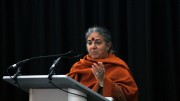The University of Manitoba’s Centre for Social Science Research and Policy (CSSRP) will host a policy talk examining Manitoba’s response to refugees and other newcomers this Thursday.
Titled “Manitoba’s Response to Refugees: What can we learn?,” the panel will discuss the province’s response to different refugee communities over the last 10 years to explore how policies could be improved.
Shayna Plaut, executive director of the CSSRP, said that this event is part of the centre’s series of bimonthly public policy talks.
“Usually the format that we use is a roundtable,” she explained. “We invite academics, we invite activists, we invite practitioners, we invite people who identify with many of those hats, including people with lived experience regarding the issues.”
Jesse Hajer, an assistant professor of economics and labour studies at the University of Manitoba, and Mona Gambo, a graduate student in economics, will present their ongoing research exploring Manitoba’s response to refugees at the event.
Their research compares the support that was provided to refugees from Syria and Afghanistan, as well as Ukrainians fleeing war in their country.
“We’re looking at the different programs, supports and innovations that have taken place with these waves of newcomers, particularly the large waves that had unified specific responses for particular groups,” Hajer said.
While he and Gambo are still finalizing their research and have no “official findings” yet, Hajer pointed to a number of different steps taken in dealing with Ukrainian newcomers.
“There’s been the reception centre at the airport, there’s been a one-stop shop set up at a nearby facility to help them with various needs, including quick access to health cards, support with child care, for example,” he explained. “Those are some of the high-level findings.”
He said their research found “similar innovations” in the government’s coordinated response to Syrian refugees, such as additional housing supports.
Hajer and Gambo’s research is part of a partnership grant to study poverty and related topics with a focus on “transformative solutions to poverty.” Several community organizations are collaborating in the grant, including Immigration Partnership Winnipeg.
“I think the motivation stems from hope that the new supports that have been made available or the new approaches that have, for example, streamlined access to provincial health benefits for the Ukrainian displaced persons can serve as a model for refugees coming to Manitoba more generally,” Hajer said.
He pointed out that many Syrian refugees’ transportation loans were waived by the government of Canada, but other refugees coming from similar circumstances around the same time did not receive the same benefit.
“So the question became then, well, why are we providing different benefits for a group coming from one country and not providing those same benefits to a group coming from another country?” he said.
“I think those types of questions are coming up again with the response to the Ukrainian situation.”
Hajer emphasized that those fleeing war in Ukraine are technically temporary residents, not refugees, a status granted to them by the Canada-Ukraine Authorization for Emergency Travel program.
Plaut called this distinction “a very unique response that’s been offered by the federal government.” This status gives them access to a work visa, which in turns enables them to get a provincial health card.
Other panelists include Shauna Labman, executive director of the University of Winnipeg’s Global College and an expert regarding refugee protection in Canada, Nick Krawetz, a key figure in designing the province’s response to Ukrainian newcomers and Shakila Atayee, an Afghan refugee with almost a decade of experience working with newcomer settlement services.
The roundtable will take place from 7:30 to 9 p.m., Feb. 9 in the Aurora Family Therapy Centre board room of the Rice Centre on Portage Avenue. Those wishing to attend the talk, which will be free, must register through Eventbrite.




